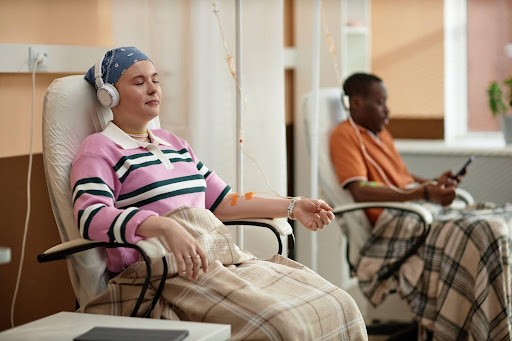
Interplay of Ovarian Cancer and Menopause: Understanding the Juncture
Empowering Women: Ovarian Cancer and Menopause Insights
Ovarian cancer, tangled with menopause, is a significant health concern often intertwined in a woman’s life particularly as she ages. While surviving those hot flashes and mood swings, during menopause, there is ovarian cancer, upon which women need to keep their radar. Although these conditions may seem distinct, their connection is profound, as post-menopausal women are at higher risk for cancer, and catching it early can be a lifesaver.
So, let’s dive into understanding the complexities of menopause associated with ovarian cancer, its symptoms, and practical strategies for managing both. Understanding this interplay is the key to prioritizing women’s health and well-being.
First, Let’s Understand the Terms Separately
Menopause is a normal physiological phase in woman’s life and marks the end of monthly menstruation and childbearing age. It typically starts between the ages of 45 to 51 and results from the deficit of ovarian follicles and a natural decline in ovarian function. Consequently, the ovarian hormones (estrogen and progesterone) get slumped and arise from various symptoms including hot flushes, night sweats, vaginal dryness, mood swings, and so forth, collectively called post-menopausal symptoms.
Ovaries are small organs on either side of the uterus responsible for producing eggs and hormones, necessary for regulating monthly menstruation cycles and women’s fertility. Ovarian cancer originates in these ovaries due to various known and unknown reasons. While menopause itself does not cause ovarian cancer, the risk of developing ovarian cancer increases as women age.
Let’s Check Out Ovarian Cancer before Menopause
Being independent of menopause, ovarian cancer can occur before menopause although it is prominent in post-menopausal women. While in post-menopausal women, hormonal deprivation is considered the major cause of ovarian cancer, the cause factors may differ in pre-menopausal women.
Genetic Predisposition
A woman with a familial history of ovarian cancer due to a genetic mutation is at a higher lifetime risk of developing such cancerous cells.
Early Menarche and Late Menopause
Early onset of menstruation due to several lifestyle modifications and late menopause enhances the risk of developing ovarian cancer before menopause.
Lifestyle Modifications
Changed food habits, including a diet high in saturated fats and smoking, increase the risk of developing ovarian cancer at a younger age.

Toxic Environment
Exposure to various environmental toxins and chemicals also contributes to the development of cancer in women before menopause.
Understanding the Intersection Between Menopause and Ovarian Cancer
The exact cause of ovarian cancer and its connection with menopause is debatable; however, it is directly or indirectly linked to the fluctuation followed by the slumping of female hormones, especially estrogen. As women navigate the changes that commence with menopause, it is very crucial to be aware of its potential connection to ovarian cancer.
Hormonal Changes
The hormonal shifts at menopause affect the ovaries and surrounding tissues ruthlessly. Estrogen, in particular, protects the cells from damage and regulates their growth. With lower levels of estrogen at menopause, potentially trigger the development of cancerous cells.
Ovulation History
Women who triggered menopause at their later ages (after age 52) are suspected to have a higher risk of ovarian cancer which is due to experiencing more ovulation in their lifetime. Women who have not been pregnant have not used birth control pills or started menstruating at an early age are at higher risk of ovarian risk. The logic is that the more the ovaries are stimulated for ovulation, the higher the risk of developing abnormal cells.

Age
With increasing age, the likelihood of genetic mutation increases up to many folds which may lead to the development of cancer cells. Here, at this point, the age at menopause and initiation of ovarian cancer coincide.
Hormone Replacement Therapy
Although it is completely under the jurisdiction of medical practitioners to prescribe the HRT and decide its time duration, using this for a longer time (say more than 8 to 10 years), particularly estrogen-only therapy, increases the risk of ovarian cancer. HRT may again stimulate the senescent ovaries and maybe that’s what triggers cancer cells to grow.
Genetic Factors
Certain genetic mutations for instance in BRCA1 and BRCA2 increase the risk of ovarian cancer however, the risk associated with these genetic factors is not directly related to menopause but can manifest around the beginning of menopause.
Recognizing the Symptoms and Early Signs of Ovarian Cancer
Staying vigilant and attentive to identifying the early signs and symptoms is imperative for the timely treatment and management of ovarian cancer both before and after menopause. The symptoms of ovarian cancer in pre-menopausal women are more or less similar to those in post-menopausal women and can often be subtle and easily mistaken. Some of the symptoms are:
- Bloating and Swelling in Abdominal Area: Persistent bloating and prominent swelling in the abdominal region due to fluid accumulation and the presence of a tumor might be an early sign of ovarian cancer.
- Pelvic Pain: Constant or intermittent pain in the pelvic region and lower back may be a sign of something not right in the reproductive organs that must be consulted with the doctors.
- Bowel Habits: Altered bowel habits including constipation or diarrhea.
- Urinary Symptoms: Increased frequency and urgency of urination even without an increase in fluid intake. If a tumor exists in the ovaries, it creates pressure on the urinary bladder and causes increased urination.
- Loss of Appetite: Feeling full all the time and loss of appetite due to abnormalities in the abdominal region.
- Fatigue: Persistent tiredness or exhaustion all the time even after having proper rest and sleep. It impairs physical, mental, and emotional components.
- Menstrual Irregularities (Before Menopause): Changes in the monthly menstrual cycle irregular bleeding (heavy or light) or sometimes missing periods might be an indication of ovarian cancer.
- Vaginal Bleeding (After Menopause): Vaginal bleeding, a most common symptom in post-menopausal women, is abnormal and should be investigated for cancers in the ovary and uterus.
The symptoms of ovarian cancer can be non-specific however, if the persistence, severity, and frequency of the above-mentioned symptoms do occur, one must visit the doctor for further examination of ovarian cancer.
Screening of Ovarian Cancer in Menopausal Women
Taking the symptoms seriously helps in the early detection of carcinoma cells and it significantly improves the prognosis whereas its detection at later stages limits the treatment strategy.
There are some screening options to discuss with the doctor, especially if a woman is at higher risk:
- CA-125 Blood Test: It is the examination of protein CA-125 (cancer antigen 125) in the blood of women suspected of ovarian cancer. This is a glycoprotein that is often present at higher levels in the blood of individuals, particularly with ovarian cancer.
- Transvaginal Ultrasound: It is an imaging procedure, used to examine the female reproductive organs including ovaries, uterus, cervix, vagina, and fallopian tube. It involves inserting a specialized transducer into the vagina which provides a closer and more detailed view of the pelvic organs.
- Biopsy: It involves the examination of ovarian tissue samples under the microscope for any abnormalities in the cells.

Treatment Regimen of Ovarian Cancer
Treatment regimens for ovarian cancer can be set based on the stage of the cancer as well as the patient’s overall health. Some available treatments are:
- Surgery: A primary treatment for ovarian cancer where the tumor in the ovaries or most of the time both the ovaries are surgically removed. It often includes the removal of the fallopian tube and uterus.
- Chemotherapy: It includes some drugs which tend to kill the cancerous cell in a targeted way. It is usually performed after surgery to eliminate the remnants of cancerous cells. Paclitaxel, Carboplatin, Cisplatin, and Docetaxal are some common drugs used in chemotherapy for ovarian cancer however, medical practitioners better know what is to be given to whom and when.
- Targeted Therapy: Here, the drugs are used which focus on specific weaknesses in the cancer cells such as mutations, and then kill them.
- Hormone Therapy: It is also used in some cases of ovarian cancer to block the hormones that fuel certain types of ovarian cancer.

Prevention and Early Detection to Reduce the Risk of Ovarian Cancer after Menopause
While it is not always possible to prevent cancer-like conditions, certain measures can reduce the risk and improve early detection:
- Regular Check-ups: Regular pelvic examinations especially after menopause and awareness of the family history can aid early detection of ovarian cancer.
- Testing of Genetic Markers: Women with a family history of cancer be it breast, uterine, or ovarian, must consider testing of some genetic markers which are the indicators of active cancer cells such as testing for mutation in BRCA1 and BRCA2.
- Healthy Lifestyle: Marinating healthy weight after a certain age, eating a balanced diet, and avoiding smoking and alcohol can reduce the risk of cancer. Don’t forget to get moving! Regular exercise boosts overall well-being.

Final Takeaway
The intersection of ovarian cancer and menopause presents unique challenges along with the pre-existing menopausal symptoms but ovarian cancer is not always bound to menopause. They may coincide together with worsening health issues; however, with increased awareness and regular check-ups, early detection is aided and a timely treatment strategy can be followed.
While the sufferings of ovarian cancer before and after menopause are daunting, the advanced medical networking, professionals, and treatment strategies ensure the best possible outcomes for those affected.
Citations
- American Journal of clinical and experimental obstetrics gynecology (2015). Menopause and ovarian cancer risk: mechanisms and experimental support. Retrieved from https://e-century.us/files/ajceog/2/1/ajceog0000588.pdf
- The Lancet (2015). Menopausal hormone use and ovarian cancer risk: individual participant meta-analysis of 52 epidemiological studies. Retrieved from https://www.thelancet.com/action/showPdf?pii=S0140-6736%2814%2961687-1
- American cancer society (2022). Ovarian cancer risk factors. Retrieved from https://www.cancer.org/cancer/types/ovarian-cancer/causes-risks-prevention/risk-factors.html
- WebMD (2023). Does menopause make ovarian cancer more likely? Retrieved from https://www.webmd.com/menopause/ovarian-cancer-menopause

Poonam Rawat





